Part 10: X. Baldwin V, Conradin I, Guiraud I 1296-1325 A.D.
The first news that reached Baldwin V was that the Byzantines wished to renew their alliance with Jerusalem. Relations between the two countries had remained friendly for many years now. Had the east not been delivered from the ungodly under their watch? King Baldwin was glad to strengthen the alliance.
More good news followed. The Khwarizmian Turks in Persia had wiped out the last major Mongolian stronghold while it was distracted by fighting Byzantium. Central Persia was still held by Muslims, but at least they weren't Mongols!
King Baldwin V had one son, named Conradin:
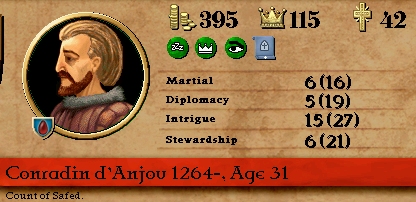
Conradin was notable for his high intrigue, but was otherwise not terribly remarkable. He was renowned for being quite lazy, in truth.
Even though the Khan of the Il-Khanate had embraced Christianity, not everyone had forgiven him or his peoples for the long wars in Persia. In September of 1297, the Duchy of Cairo attacked the tiny remnants of the once mighty Khanate.

The Il-Khanate went out with a whimper, disappearing by December. The Khan, and those of his men who had also converted to Christianity were allowed to retire quietly to poor estates in southern Egypt. The rest of the Mongols were killed.
In March of 1298, emboldened by the defeat of the Il-Khanate, King Baldwin V decided to bring the vassals who had rebelled away from King Girard back into the Kingdom. It would not be wise to allow them to remain independent for too long.
He first attacked the independent Duchy of Outrejourdain and had revassalized them by May. Baldwin gained no bad reputation from this, as he had not taken any land for himself and had a claim on the title of the Duchy, so he followed it up by an invasion of Antioch. Antioch quickly bowed before the might of the Kingdom.
A northern Arabian Duchy attempted to revolt as King Baldwin was preparing to invade Crete and they too were quickly taught the folly of their ways. Tripoli too, was not keen on the new King and attempted to break free with little success.
Just before King Baldwin's men landed on Crete, news came of a new military discovery.

His knights would find this new armor useful.
By the spring of the year 1300 almost all the land lost under King Girard had been regained for the Kingdom. Baldwin V was quite pleased. It was a legacy worthy of any king.
There was only one thorn in his side. Baghdad.
The city was part of the King's personal demesne, and had been since Good Saint Louis had conquered it, back in 1269. But the city was a violent, lawless place. Every year or two, sometimes even more often, thousands of rebels would rise up and need crushing. This was a tiring affair, as the troops to suppress them would often need to be raised from around Jerusalem and marched east across the desert. When the King had been on campaign there had been many times when it had simply not been possible to get troops down to Baghdad quickly. Once the city had even fallen to the rebels, although the Mongols had not left much behind for them to destroy.
Late in 1301 another large rebellion rocked the city, and King Baldwin V gathered up his troops and rode east to confront them, arriving at the province in January of 1302.
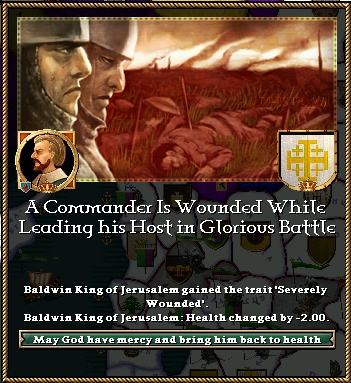
Sixty-three year old King Baldwin was struck by an arrow as he was marshaling his troops for an assault on the rebel positions. He was rushed back to Jerusalem where he lingered for several months while his commanders crushed and executed every single rebel.
In March, Baldwin V finally succumbed to his wound and his son, Conradin, took the throne.
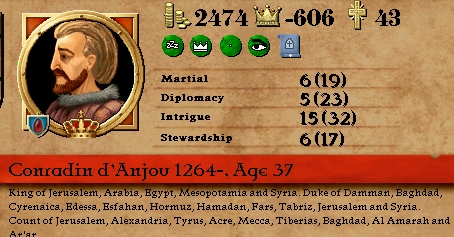
Conradin was lazy, arbitrary, modest, and suspicious. He had one bastard, but no son of his own. Next in line for succession was the Duke of Cairo, Guiraud, one of Saint Louis' several nephews, and great-grandson of Baldwin IV.
The Duke of Antioch strongly disapproved of King Conradin, and revolted against his rule. Like his father, King Conradin was a leader of men and showed great valor on the battlefield during his campaign to retake Antioch.
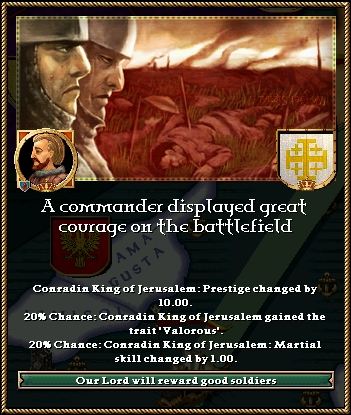
The next years were largely peaceful. There was a brief conflict when some of King Conradin's vassals attacked the breakaway Emirate of Azerbaijan, but the rebels were quickly reabsorbed by the Khwarizmian Turks of Persia, before Jerusalem could make any headway against them.
The Kingdom's stability, which had dropped to -3 during King Girard's reign climbed back to 0 in 1306 and +1 in 1307. King Conradin also saved enough money to get the Kingdom out the crippling debt it had been in for many years.
Baghdad however was still a hell-hole of violence. In April of 1311, King Conradin led a charge against the rebels. He was knocked from his horse and badly injured by a blow from a Muslim scimitar.
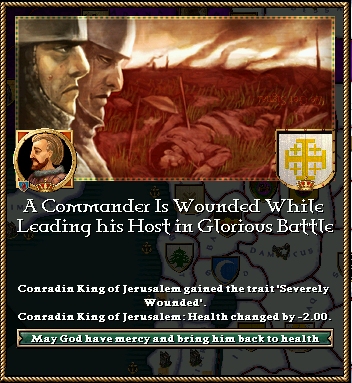
He died just weeks later. The city of Baghdad had claimed another King of Jerusalem.
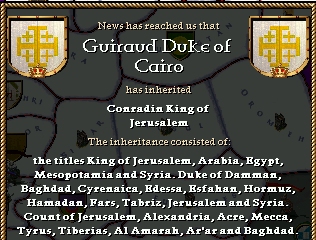
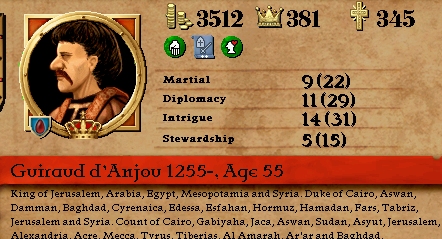
King Guiraud took the throne in late May of 1311. He was an honest, amiable, martial cleric. As he was already fifty-five years old, few in the Kingdom thought he would reign long. Attention turned to his two sons, Martin the eldest, and Baldwin the younger. Both Martin and Baldwin were married, but neither had a single child, not even a daughter.
Once he had thoroughly slaughtered the rebels who had killed King Baldwin, and taken his vengeance on Baghdad, King Guiraud began to draw up plans. Neither of his sons looked likely to produce an heir, and the last thing the Kingdom needed was more chaos and uncertainty.
So he would just need to have more sons, that was all.
After some searching, the old King found himself a nubile young woman of a family of known fertility. He married her in June. She was pregnant by July.
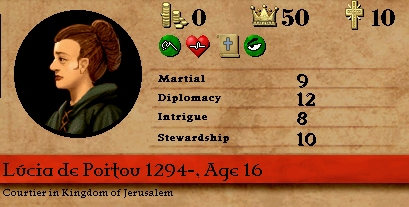
King Guiraud's plan was simple. When he died, Martin would take the throne and Baldwin would follow. But his first sons were getting old. If Guiraud could have a son and live a few more years, and both Martin and Baldwin reigned at least eight years then his newborn son would just be reaching adulthood. The lad could take over in the prime of his life with no worry about Regency Councils or the Crown passing to some other branch of the family.
What could possibly go wrong?
Well, a daughter for starters.
Young Lucia was, of course, delighted by her little baby girl, but she knew perfectly well how disappointed her husband was. Moreover, she was a clever young woman and understood that her own happiness was quite secondary to the health and welfare of the Kingdom of Christ on Earth.
She took her marital duties seriously, and in May of 1314 was pregnant again. That summer, the Kwarizmain Turks attacked the Kingdom.
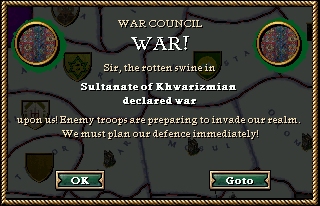
The initial stages of the war went surprisingly well. Kwarizmain territory was split into two main pieces. A large chunk in central Persia and another in and around Georgia and the western shores of the Caspian Sea.
In December of 1314, Lucia gave birth to a son, who King Guiraud named Simoun. He had rarely been so happy. The battle against the Kwarizmain was going well. Although the Kingdom lost many men, it looked like he might soon be adding the Crown of Persia to his holdings.
But, it was never wise to count ones blessings too early.

Here you can see a map of the war situation in the summer of 1315.
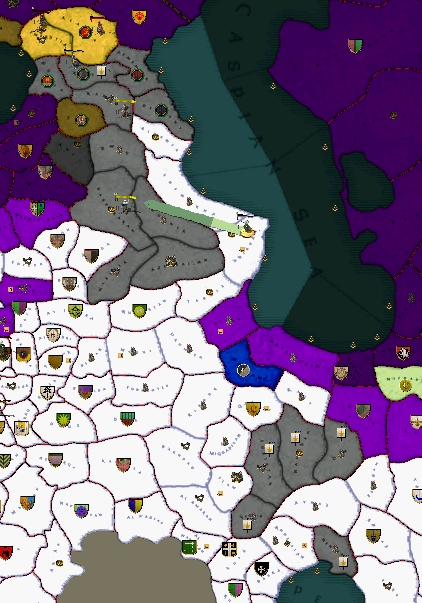
You can see the banner of the Kingdom on the five gray provinces in central Persia, and also on the Kwarizmain capital in the north. But the Turks refused to make peace. They wouldn't surrender a single province. The also seemed to have summoned a vast army that outnumbered the Kingdom, whose numbers had been whittled down in central Persia.
King Guiraud might have raised more of his vassal's troops, but he was already hovering dangerously close to being in debt. The war ground on for another year, and Jerusalem suffered several defeats at the hands of the Turks, although they didn't lose a single province.
Finally, in the summer of 1316, King Guiraud agreed to a white peace, not having gained a single territory for all his troubles. That was, he supposed, the fortunes of war. At least he had not died in battle like his predecessors!
Shortly after the peace treaty was signed Lucia gave birth to another son, name Florenc. That fall she became pregnant again! This time, however, the baby was stillborn. Many talked loudly of King Guiraud's virility. He was after all, sixty-one years old. Few had expected him to rule so long, nor to be fathering more children!
In 1318, Guiraud led a short campaign to mop up some of the small, unaffiliated Emirates in Persia and secure the Kingdom's borders around the Kwarizmain holdings.
Good news came in 1320. The sixty-five year old King Guiraud became Emperor Guiraud in August, with the blessings of the Pope.
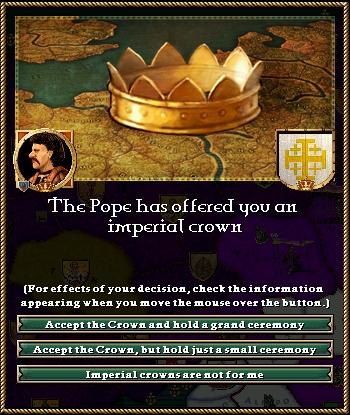
A fitting year, too to be crowned Emperor. 1320 is the halfway point to the year 1453 and the end of Crusader Kings. Here you can see a thumbnail of the Imperial holdings in that pivotal year:
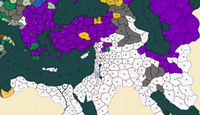
(Click for big)
In May of 1321 the island of Crete revolted again, although Emperor Guiraud was quick to use his Alexandrian troops to reassert his authority.
Although he was not a great conqueror, like the Emperor Saint Louis had been, Emperor Guiraud was well-loved by his people. He saved great sums of money and spent much of it on improving the territories of the Kingdom. Revolts dwindled to nearly nothing and even Baghdad became peaceful. Indeed, Emperor Guiraud saw fit to spend a fair bit of money on that ravaged city, slowly building it back up from the Mongol devastated ruins it had once been.
In 1322, Emperor Guiraud's wife gave birth to a daughter, and in 1323, on his sixty-eighth birthday, she gave birth to another son, this one named Barral. The Emperor, it was agreed, was quite active for his age.
But no man lives forever.
In the winter of the year 1325, just a few days before Christmas, the seventy year old Emperor Guiraud laid down his burdens forever.
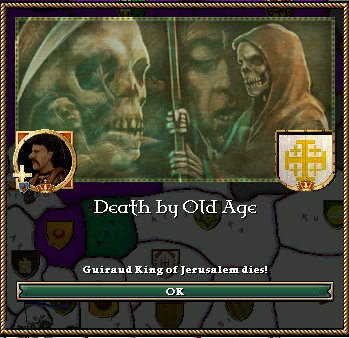
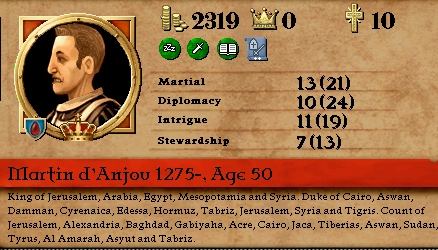
ALL HAIL MARTIN, KING OF JERUSALEM, KING OFARABIA, KING OF EGYPT, KING OF MESOPOTAMIA, KING OF SYRIA! LORD IN THE EAST! BELOVED OF CHRIST! SAVIOR OF THE FAITH!
ALL HAIL KING MARTIN!